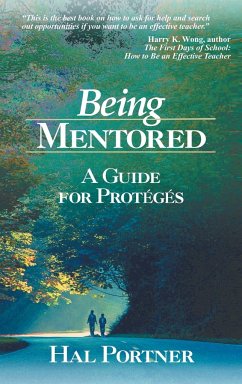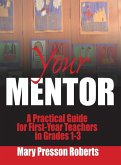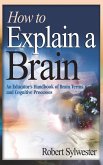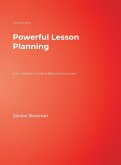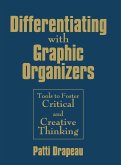- Gebundenes Buch
- Merkliste
- Auf die Merkliste
- Bewerten Bewerten
- Teilen
- Produkt teilen
- Produkterinnerung
- Produkterinnerung
In this book, you will find all you need to recognize and utilize the valuable rewards uncovered throughout the mentoring process.
Andere Kunden interessierten sich auch für
![Great Quotes to Inspire Great Teachers Great Quotes to Inspire Great Teachers]() Noah BensheaGreat Quotes to Inspire Great Teachers67,99 €
Noah BensheaGreat Quotes to Inspire Great Teachers67,99 €![Your Mentor Your Mentor]() Mary Presson RobertsYour Mentor65,99 €
Mary Presson RobertsYour Mentor65,99 €![How to Explain a Brain How to Explain a Brain]() Robert SylwesterHow to Explain a Brain68,99 €
Robert SylwesterHow to Explain a Brain68,99 €![Secrets to Success for Social Studies Teachers Secrets to Success for Social Studies Teachers]() Ellen KottlerSecrets to Success for Social Studies Teachers74,99 €
Ellen KottlerSecrets to Success for Social Studies Teachers74,99 €![Powerful Lesson Planning Powerful Lesson Planning]() Janice SkowronPowerful Lesson Planning71,99 €
Janice SkowronPowerful Lesson Planning71,99 €![Differentiating With Graphic Organizers Differentiating With Graphic Organizers]() Patti DrapeauDifferentiating With Graphic Organizers79,99 €
Patti DrapeauDifferentiating With Graphic Organizers79,99 €![Making Physics Fun Making Physics Fun]() Robert PrigoMaking Physics Fun67,99 €
Robert PrigoMaking Physics Fun67,99 €-
-
-
In this book, you will find all you need to recognize and utilize the valuable rewards uncovered throughout the mentoring process.
Produktdetails
- Produktdetails
- Verlag: Corwin
- Seitenzahl: 98
- Erscheinungstermin: 5. Juni 2002
- Englisch
- Abmessung: 235mm x 157mm x 10mm
- Gewicht: 305g
- ISBN-13: 9780761945529
- ISBN-10: 0761945520
- Artikelnr.: 21156178
- Herstellerkennzeichnung
- Libri GmbH
- Europaallee 1
- 36244 Bad Hersfeld
- gpsr@libri.de
- Verlag: Corwin
- Seitenzahl: 98
- Erscheinungstermin: 5. Juni 2002
- Englisch
- Abmessung: 235mm x 157mm x 10mm
- Gewicht: 305g
- ISBN-13: 9780761945529
- ISBN-10: 0761945520
- Artikelnr.: 21156178
- Herstellerkennzeichnung
- Libri GmbH
- Europaallee 1
- 36244 Bad Hersfeld
- gpsr@libri.de
Hal Portner is a former K-12 teacher and administrator. He was assistant director of the Summer Math Program for High School Women and Their Teachers at Mount Holyoke College, and for 24 years he was a teacher and then administrator in two Connecticut public school districts. From 1985 to 1995, he was a member of the Connecticut State Department of Education's Bureau of Certification and Professional Development, where, among other responsibilities, he served as coordinator of the Connecticut Institute for Teaching and Learning and worked closely with school districts to develop and carry out professional development and teacher evaluation plans and programs. Hal developed and teaches for Western New England University a 3 credit MEd in Curriculum and Instruction online core course in Mentoring, Coaching, and professional development. Portner writes, develops materials, trains mentors, facilitates the development of new teacher and peer-mentoring programs, and consults for school districts and other educational organizations and institutions. In addition to Mentoring New Teachers, he is the author of Training Mentors Is Not Enough: Everything Else Schools and Districts Need to Do (2001), Being Mentored: A Guide for Protégés (2002), Workshops that Really Work: The ABCs of Designing and Delivering Sensational Presentations (2005), and editor of Teacher Mentoring and Induction: The State of the Art and Beyond (2005) - all published by Corwin Press. He holds an MEd from the University of Michigan and a 6th-year Certificate of Advanced Graduate Study (CAGS) in education administration from the University of Connecticut. For three years, he was with the University of Massachusetts EdD Educational Leadership Program.
Preface Acknowledgments About the Author Introduction 1. Participate Take the Initiative Developing the Relationship Takes Time Earn and Keep Your Mentor
s Trust Clarify Communication 2. Take Responsibility Don
t Wait, Instigate Feedback and How to Receive It When to Give Feedback Mismatched Mentoring Relationships Responsibility to Yourself Responsibility to Others Get to Know Your Principal Clarify Ground Rules Early 3. Observe Be an Objective Observer What to Observe Expand Your View Don
t Imitate, Create 4. Ask Whom to Ask Where to Ask How to Ask What to Ask For Why Ask? 5. Chart Your Course Find Out What You Don
t Know Set Priorities Identify Resources The Power of Planning 6. Network Support From Collegial Groups Guidelines for Support and Discussion Groups Networking on the Internet Working With College and University Professors and Cohorts 7. Take Informed Risks Look Before You Leap Should You or Shouldn
t You? Help the Risk Succeed Risk With Conviction 8. Reflect Keep a Professional Learning Journal Guided Reflection Focused Reflection 9. Give Back Leave a Legacy Be a Change Agent Experienced Newcomers The Gift of Renewal Resource A: Internet Sites and Publications for New Teachers Resource B: Professional Education Organizations and Their Web Pages Resource C: Chatboard Exchange on the Internet References
s Trust Clarify Communication 2. Take Responsibility Don
t Wait, Instigate Feedback and How to Receive It When to Give Feedback Mismatched Mentoring Relationships Responsibility to Yourself Responsibility to Others Get to Know Your Principal Clarify Ground Rules Early 3. Observe Be an Objective Observer What to Observe Expand Your View Don
t Imitate, Create 4. Ask Whom to Ask Where to Ask How to Ask What to Ask For Why Ask? 5. Chart Your Course Find Out What You Don
t Know Set Priorities Identify Resources The Power of Planning 6. Network Support From Collegial Groups Guidelines for Support and Discussion Groups Networking on the Internet Working With College and University Professors and Cohorts 7. Take Informed Risks Look Before You Leap Should You or Shouldn
t You? Help the Risk Succeed Risk With Conviction 8. Reflect Keep a Professional Learning Journal Guided Reflection Focused Reflection 9. Give Back Leave a Legacy Be a Change Agent Experienced Newcomers The Gift of Renewal Resource A: Internet Sites and Publications for New Teachers Resource B: Professional Education Organizations and Their Web Pages Resource C: Chatboard Exchange on the Internet References
Preface Acknowledgments About the Author Introduction 1. Participate Take the Initiative Developing the Relationship Takes Time Earn and Keep Your Mentor
s Trust Clarify Communication 2. Take Responsibility Don
t Wait, Instigate Feedback and How to Receive It When to Give Feedback Mismatched Mentoring Relationships Responsibility to Yourself Responsibility to Others Get to Know Your Principal Clarify Ground Rules Early 3. Observe Be an Objective Observer What to Observe Expand Your View Don
t Imitate, Create 4. Ask Whom to Ask Where to Ask How to Ask What to Ask For Why Ask? 5. Chart Your Course Find Out What You Don
t Know Set Priorities Identify Resources The Power of Planning 6. Network Support From Collegial Groups Guidelines for Support and Discussion Groups Networking on the Internet Working With College and University Professors and Cohorts 7. Take Informed Risks Look Before You Leap Should You or Shouldn
t You? Help the Risk Succeed Risk With Conviction 8. Reflect Keep a Professional Learning Journal Guided Reflection Focused Reflection 9. Give Back Leave a Legacy Be a Change Agent Experienced Newcomers The Gift of Renewal Resource A: Internet Sites and Publications for New Teachers Resource B: Professional Education Organizations and Their Web Pages Resource C: Chatboard Exchange on the Internet References
s Trust Clarify Communication 2. Take Responsibility Don
t Wait, Instigate Feedback and How to Receive It When to Give Feedback Mismatched Mentoring Relationships Responsibility to Yourself Responsibility to Others Get to Know Your Principal Clarify Ground Rules Early 3. Observe Be an Objective Observer What to Observe Expand Your View Don
t Imitate, Create 4. Ask Whom to Ask Where to Ask How to Ask What to Ask For Why Ask? 5. Chart Your Course Find Out What You Don
t Know Set Priorities Identify Resources The Power of Planning 6. Network Support From Collegial Groups Guidelines for Support and Discussion Groups Networking on the Internet Working With College and University Professors and Cohorts 7. Take Informed Risks Look Before You Leap Should You or Shouldn
t You? Help the Risk Succeed Risk With Conviction 8. Reflect Keep a Professional Learning Journal Guided Reflection Focused Reflection 9. Give Back Leave a Legacy Be a Change Agent Experienced Newcomers The Gift of Renewal Resource A: Internet Sites and Publications for New Teachers Resource B: Professional Education Organizations and Their Web Pages Resource C: Chatboard Exchange on the Internet References

